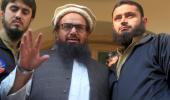The Supreme Court on Monday upheld the conviction and life sentence of four persons for the December 2005 terror attack at the Indian Institute of Science in Bengaluru in which a retired IIT-Delhi professor was killed and four others were injured.

A bench of justices UU Lalit, Hemant Gupta and S Ravindra Bhat dismissed the appeals of the four convicts, observing that strict action should be taken against conspiracies aimed at causing danger to public property and the general public.
The convicts - Mohammad Irfan, Nizamuddin, Mohammad Irfan and Noorullah Khan - had moved the top court challenging the order of the Karnataka high court in May 2016.
The apex court said it does not find any merit in the appeals against the High Court order enhancing the quantum of punishment from seven years, which was awarded by the trial court, to life imprisonment for the offence punishable under Section 121-A of the IPC (conspiracy to wage war against the government).
“We have given serious consideration to this submission. The conspiracy as disclosed in the instant matter, if it had been carried out, would have resulted in great damage and prejudice to the life and well-being of the members of the general public as well as loss to public property.
"'Such conspiracies to cause danger to public property or the safety of the members of the general public ought to be dealt with strictly,” the court said.
It said that under Section 121 of the IPC, the waging of war or attempt to wage war or abetting of waging of such war against the Government of India constitutes an offence.
“Section 121-A of the IPC, however, deals with conspiracy to commit offences punishable under Section 121 of the IPC as well as conspiracy to overawe by force the central government or any state government.
In terms of its application, the width of Section 121-A is thus not confined to conspiracy to commit offences punishable under Section 121 of the IPC alone, it said.
The court said that as the text of the relevant Section shows, persons who plan to overawe the central or the state government by criminal force or show of criminal force would be guilty of the offence of entering into a conspiracy in terms of Section 121A of the IPC.
“The dictionary meaning of the expression “overawe” is to subdue or inhibit with a sense of awe. The expression “overawe” would thus imply the creation of apprehension or situation of alarm...
"As rightly held by the Division Bench (of the High Court), it would not be necessary that the danger should be one of assassination or of bodily injury to the members of the machinery or apparatus of the Government but the danger might as well be to public property or to the safety of members of the general public”, it said.
The bench said that the conspiracy in the case, the intent of which was clear from the minutes of the meetings and the consequential acquisition of arms and explosives, would thus come well within the latter part of the conspiracy dealt with in Section 121A of the IPC.
“As the explanation to Section 121A of the IPC discloses, for an offence of conspiracy, it would not be necessary that any act or illegal omission must take place in pursuance thereof. 'Thus, even though no untoward incident had actually happened as a result of the conspiracy, the matter would still come within the four corners of Section 121A of the IPC. The conviction recorded against the accused under Section 121A of the IPC does not therefore call for any interference”, it said.
The top court said that considering the acquisition of a substantial quantity of arms and explosives as well as the intent disclosed by a diary recovered from one of the convicts and other materials on record, the High Court was right in enhancing the sentence after accepting the appeal of the State.
The top court also dealt with the charge of conspiracy under section 120-B (criminal conspiracy) of the IPC and said that since an express provision for a particular kind of conspiracy is dealt with specifically in Section 121A of the IPC, the provision contained in Section 120-B of the IPC would have no application.
Out of the seven accused, one was acquitted of all the charges while one was awarded eight years sentence and the rest five were awarded a life sentence by the high court.
On December 17, 2011, the trial court acquitted one of all the charges and held six of them guilty of waging war against the country and other offences and awarded them a life term.
The eight persons arrayed as accused in the case also included Afsar Pasha, Mehboob Ibrahim Sab Chopdar, Chand Basha and Ahmed Basha.
On December 28, 2005, two armed persons had entered the IISC campus in Bengaluru at around 7 pm in a car when students and delegates were heading to attend the dinner after a conference and fired indiscriminately at them.











 © 2025
© 2025